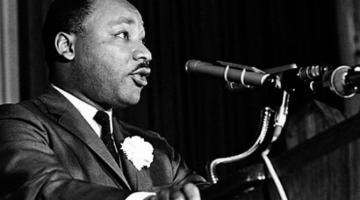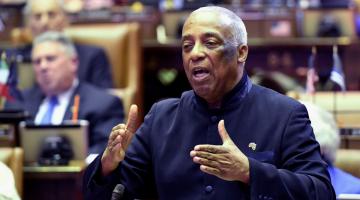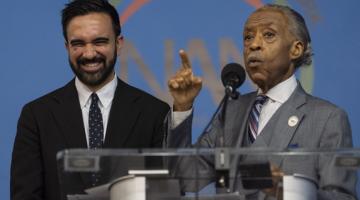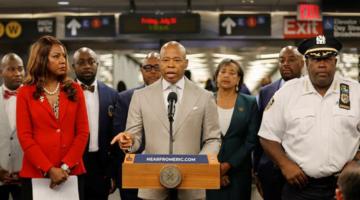CSSBMB at the 51st Annual Legislative Conference of the Congressional Black Caucus (CBC) [U.S. Commission on Civil Rights]
The U.S. Commission on the Social Status of Black Men and Boys’ is but one example of the shallow opportunism of the Black misleadership class and of Barack Obama's treachery.
A protege of Martin Luther King Jr.’s mentor, Howard Thurman, the Reverend Walter Earl Fluker is a published author, accomplished raconteur and coveted moderator, by turns eloquent and blunt-spoken, and possessed of an appeal so irresistible that I would wager he could charm a cat off a fish truck. But not even Fluker’s uncommon gifts–not his gravitas, or his droll wit, his expansive vocabulary, or his clever repartee–could salvage anything of value from the U.S. Commission on the Social Status of Black Men and Boys’ ACT NOW Summit.
The three-hour conference last July was intended to showcase the federal agency that was created by Congress in 2020 to respond to the nationwide protests against racist policing triggered by George Floyd’s lynching. But the summit was doomed even before it began, undone by poor planning, worse execution and a puzzling series of gaffes, miscues, and snafus.
Consider as one example the bizarre tweets leading up to the conference which inexplicably misspelled the future tense of the word “broadcast”–not once but thrice– in announcing that the ACT NOW Summit “will be broadcasted live. . .on YouTube.”
Similarly, while the conference began at 11 a.m., the commission neither provided lunch nor even allowed conferees time to eat, breaking for all of five minutes at roughly the 90-minute-mark. (If the YouTube videotape is to be believed, a third of the attendees did not return after the brief break.)
And perhaps most bizarre was Commissioner Tina Louise Martin’s introduction of Fluker in a manner so robotic and passionless that it was redolent of a scene filmed by the cult Hollywood director Ed Wood who was known for his wooden scripts, or worse yet, a Saturday Night Live parody of a hostage video.
Upon stepping to the dais following Martin’s enervating introduction, Fluker immediately tried to break the somnolent spell she had cast on the audience.
Now I want everyone to repeat after me:
I am. . .
I am. . .
Awake.
Awake.
These glitches, however, pale in comparison to the ACT NOW Summit’s most glaring deficits which were that it was unimaginative, uninspired, and undeserving of so much as a second thought by anyone grappling earnestly with the conundrum of chattel slavery’s enduring afterlife.
For starters, it was just too shambolic and too small to have any impact, let alone gin up enthusiasm for the federal agency’s putative goal of expanding opportunities for Black men and boys whose life trajectories mirror that of George Floyd’s; no more than two dozen people attended the symposium, held in a small conference room at the National Press Club in downtown Washington D.C.
And then there was the format: six groups of scholars and activists speaking in elliptical, 10-minute bursts on subject matter that ranged from racial disparities in education, to housing, to the criminal justice system. Academic conferences typically dissect just one of these subjects over the course of an entire day–and sometimes as many as five days– and so the Act Now Summit’s meandering agenda was a lot to take in over a span of three hours, particularly on an empty stomach. And while the speakers did yeoman’s work, they were straitjacketed by time constraints that left them unable to articulate very little that was either new or surprising, or take the proverbial “deep dive” into the dystopian phenomena that circumscribe the lives of African Americans.
This lack of focus added to the ACT NOW Summit’s amateurish quality, and raised more questions than it answered. First, who was the intended audience? Surely it wasn’t African Americans of the same socio-economic background as Floyd, or those who poured into the streets in 2020 to protest his lynching by Minneapolis police. Had that been the case, then why was the staunch conservative Larry Elder allowed to deliver not one, but two stump speeches as he campaigned for the Republican party’s 2024 presidential nomination? As Elder himself acknowledged, few African Americans have any truck with his victim-blaming rhetoric that is mindful of Daniel Patrick Moynihan’s discredited scholarship, and shifts the blame for the Black community’s woes from systemic racism and post-industrialism to the folkloric trope of deadbeat dads.
And secondly, what was the convening’s objective? The ACT NOW Summit might’ve been more aptly dubbed the ACT HOW Summit? If the goal was, as stated, to begin to open doors for African American males who have long been denied access to mainstream public life, then the summit was an unequivocal bust; among the conferees’ recommendations were vague, jejune suggestions to “dismantle the school-to-prison pipeline,” identify Black leaders in their formative years, educate tenants on the terms and conditions of their apartment leases and exhort teachers to “be more intentional during the school day.”
By any objective measure, the U.S. Commission on the Social Status of Black Men and Boys is an abysmal failure. Despite an annual budget of more than $2 million, the CSSBMB–as it is colloquially known on Capitol Hill–has not made a single policy recommendation to Congress, has no website, and no social media buzz, with only 55 followers on Facebook and 144 followers on the platform formerly known as Twitter. Nearly six months after it was first broadcast–or is it broadcasted?–on YouTube, the Act Now Summit logged 773 views; by comparison, an 18-second YouTube video of a napping beagle logged 1.9 million views over roughly the same time span.
And the lassitude that characterized the Act Now Summit stands in stark contrast to the white-hot sense of urgency that continues to animate poor and working-class African Americans who remain literally in the line of fire amid whites’ growing backlash to a worsening economic crisis. Police killed 1,120 Blacks over a 48-month span ending in 2023 and the pace has only accelerated since the Commission on the Social Status of Black Men and Boys opened for business in August of 2020. That includes 305 African Americans killed by police in 2022, the highest total since 2013 when demographers first began compiling such statistics.
The Commission’s ineffectiveness is hardly surprising, however, given the history of what scholars refer to as “riot commissions.” In her marvelous book, Flak-Catchers: One-Hundred Years of Riot Commission Politics in America, Lindsey Lupo, an assistant professor of political science at Point Loma Nazarene University in San Diego wrote:
Over the last century, most racial uprisings in America’s urban cities have been systematically followed by an official commission, set up to investigate the causes of the riots, to produce recommendations for social change, and to offer a plan to prevent reoccurrence. However, more often than not, these commissions fail to produce any significant changes, leading to what Michael Lipsky and David Olson have referred to as “commission politics.” The term “commission politics” generally, refers to the way in which a racial crisis is subjected to a governmental process, whereby the riot is managed rather than studied, and any inquiry into the larger social problems underlying the riot becomes secondary to the restoration of law and order.
In other words, riot commissions are Trojan horses intended to give the appearance “of action but are little more than a tool to maintain the status quo,” Lupo wrote in her study of five such governmental, fact-finding panels: Chicago in 1919, Harlem in 1935, Watts in 1935, the U.S. in 1967 and the 1992 Los Angeles rebellion. Of the violence that erupted following the acquittal of five white police officers caught on video brutalizing Rodney King during a traffic stop, Lupo recounted a handwritten note from President George H.W. Bush to an African American minister after surveying the damage on-the ground in Los Angeles:
We are back here now thinking how best to follow up. I know you strongly support a commission. I will talk further about that. You know my concerns that a commission not produce yet another study that no one reads.
The gold standard of riot commissions is inarguably the U.S. Commission on Civil Disorders that was tasked by Lyndon Johnson’s administration with identifying the origins of two urban rebellions in 1967– Detroit and Newark– that left 69 dead cumulatively. In only seven months, the Kerner Commission–so called because it was chaired by former Illinois Governor Otto Kerner–produced a groundbreaking 426-page- report in February of 1968, anticipating the nationwide upheaval that would follow the assassination of Martin Luther King Jr. just weeks later.
The Report on the National Advisory Commission on Civil Disorders became an instant bestseller, largely because it broke with tradition by placing the onus for violent uprisings squarely on whites’ racist attitudes rather than assigning blame to a mythical Black culture that promotes criminality, laziness and irresponsibility. At times the report bordered on prophecy, asserting in its most famous passage:
Our nation is moving toward two societies, one black, one white—separate and unequal.
Continuing, it averred:
What white Americans have never fully understood — but what the Negro can never forget — is that white society is deeply implicated in the ghetto. White institutions created it, white institutions maintain it, and white society condones it.
Conversely, it took the U.S. Commission on the Social Status of Black Men and Boys more than two years to publish its inaugural annual report that, at 116 pages, was nearly four times shorter than the Kerner Commission’s signature paper even though it took nearly four times longer to write. Worse yet, the report compiled by the CSSBMB was as artless and pedestrian as the Kerner Commission report was finely wrought. You’ve no doubt heard the phrase “damning with faint praise?” The Commission on the Social Status of Black Men and Boys’ inaugural annual report praises white supremacy with faint damnation, relying strictly on secondary sources to merely reheat old ideas, many of which were introduced into the mainstream discourse 12 years earlier by Michelle Alexander’s 2010 bestseller, The New Jim Crow. Compare the Kerner Commission’s almost Biblical prose describing a nation split asunder along tribal lines with the superficial and stale book-report-quality of the CSSBMB’s annual report:
Mass incarceration has had debilitating effects on Black men’s ability to engage in the civic and political affairs that govern their lives, participate economically, compete in the workforce, and access social service benefits enjoyed by citizens of the United States.
In the final analysis, neither of the two riot commissions produced any meaningful change, but the Kerner Commission’s report was a sincere and spirited effort undertaken by 11 serious commissioners, nine of whom were white. Conversely, all 19 commissioners and six professional staffers who comprise the Commission on the Social Status of Black Men and Boys are African American, and yet it resembles the clown car at the UniverSoul Circus: open a door–any door–and a Black clown is bound to tumble out.
There are the baby clowns: the administrative assistant who once suggested that an agency charged with studying racial disparities travel to Utah–with an African American population of 1.6 percent–to study criminal justice reforms; the social media specialist who was responsible for the tweets that misspelled “broadcast” ahead of the Act Now Summit; Commissioner Tina Louise Martin’s son, who was the architect of the Act Now Summit and a rising star at the commission despite his 2022 arrest for allegedly shooting out the glass doors to a southern Maryland Bank; and the commission’s social scientist who authored the didactic annual report and whose policy formulations reflect a Booker T. Washington-like understanding of settler colonialism in which there exists no problem so onerous that African American men can’t overcome it merely by pulling up their sagging pants.
And then there are the ringleaders of the CSSBMB circus: the aforementioned Tina Louise Martin; the Commission’s chair, Representative Frederika Wilson who represents Florida’s 24th Congressional District, a staunch Zionist sock puppet who was one of 22 Democrats who voted to sanction Michigan Representative Rashida Talib for her denunciation of Israel’s indiscriminate bombing and blockade of Gaza and in 2022 endorsed legislation threatening sanctions against African countries that continue to trade with Russia amid its war with Ukraine; and finally, the CSSBMB’s Director, Mark Spencer.
I would be remiss if I failed to mention at this juncture that I have a dog in this fight: not only did I work for the U.S. Commission on the Social Status of Black Men and Boys for 10 months before I was summarily fired in July of 2023– just days before the Act Now Summit–but I have known the director, Mark Spencer, for 31 years and considered him among my best friends for most of that time.
We met in 1993 when I was a police reporter for the Washington Post and he was a homicide prosecutor for the state’s attorney’s office in the D.C. suburb of Prince George’s County, Maryland. As two tall, African American men born in the 1960s, we bonded immediately over the radical politics of Malcolm X, Kwame Nkrumah, Frantz Fanon and George Jackson, our similar analyses of end-stage settler colonialism and imperialism, and perhaps most importantly, the betrayal of poor and working class African Americans by the Black misleadership class, the phrase popularized by Black Agenda Report’s co-founder and executive editor, the late Glen Ford. I have fond memories of Mark’s father, Melvin Spencer, telling me how proud he was of me when my Post editors assigned me to head the newspaper’s southern Africa bureau and I think it only fair to note that over the last 15 years, Mark has bailed me out of more jams that I can recount, including hiring me as the Commission’s senior writer in September of 2022, a scant six weeks after he took the job as director.
Our friendship, however, began to unravel almost from my first day on the job. About two weeks in, I had a confrontational video call with the Communications Director for the U.S. Commission on Civil Rights, which houses CSSBMB, and the consulting firm that handled media outreach for the commission, the Veng Group. At issue most immediately was my proposal to replace the commission web page’s dry, boilerplate language and dull photography with a livelier narrative and more stunning visual presentation, and to publish an interactive, digital version of the annual report.
Neither the Communications Director, Angelia Rorison, or the two representatives for the Veng Group, would hear of it, however and responded in no uncertain terms that what I and my coworker, program manager Aaron McCoy, were asking was simply not possible, at least not in the short term. I was stunned and did not shy away from saying so; never in my professional life, I said, had I heard of a vendor dictating the scope of work to the client. I dubbed the Veng Group and Rorison the “House of No.”
All three were indignant with Rorison snarling that she had worked for the federal government for 19 years.
No sooner had we hung up than my cell phone rang. It was Mark. He had heard what had happened and wanted me to apologize. I did because I figured that he was playing the long game, and an apology would buy us time to put his plan in motion.
There was no plan, and the apology was intended only to signal to massa that he was a “safe” Negro. Sensing weakness, Rorison–who is of Asian descent as is the Veng Group’s founder, Vincent Eng–moved in for the kill in her application to be white, or at least white adjacent, similar to the Latino city council members who made racist remarks about African Americans in a leaked audio tape. Within weeks of my arrival at the commission, Aaron and I had rewritten the copy on the web page and created photo collages that the Veng Group never published. As of this writing, the CSSBMB web page is the same as it was three years ago. What’s more, the Veng Group dictated to the commission its content strategy, going so far as to disapprove of a birthday tribute to Angela Davis because she was a “communist.”
Mark did not challenge the Veng Group’s illegitimate authority, however, and continued to supply the consulting firm with the rope to hang the commission. When I questioned why he would collaborate with a vendor that was engaged in open sabotage, he answered, absurdly, “because I’m cutting them a check.”
Months after the standoff with the Veng Group, Aaron and I pleaded with Mark to intervene on behalf of the Baltimore Collegiate School for Boys. The city’s board of education was threatening to revoke the school’s charter for some esoteric administrative missteps but Aaron and I had spent a morning at the school just a few weeks earlier and what we saw was the kind of energetic, disciplined learning environment that Black boys thrive in. It was plain as day that the school board’s threats were politically motivated but Mark wouldn’t budge, refusing to write even the most anodyne letter in support of the school. It reminded me of the NAACP’s Executive Secretary Walter White who initially refused to represent the nine Black teenagers who were falsely accused of raping two white sex workers aboard a train traveling through Alabama in 1931. The Communist party would eventually pick up the slack and the party’s support of the Scottsboro Boys would coax white labor leaders to open their doors to African American workers, which would in turn spark the New Deal, and the civil rights and radical Black power movements that emerged a generation later.
But in an almost perfect example of the class tensions that divide African Americans, the NAACP’s White wrote at the time of the Scottsboro Boys arrest:
The N.A.A.C.P. is not an organization to defend Black criminals. We are not in the field to condone rape, murder and theft because it is done by Black men. … When we hear that eight colored men have raped two white girls in Alabama, we are not first in the field to defend them. If they are guilty and have a fair trial the case is none of our business.
By failing to tell the story of America’s oppression of Black men in intimate detail, Mark eschewed the grassroots model of social transformation for a top-down strategy that has worked to dramatically reduce the NAACP’s effectiveness over the course of its existence. Mark’s ideas were, by and large, puny, and no better, in the main, than those articulated by the commission’s chair, Representative Frederika Wilson, who believes that mentoring can dismantle the gauntlet of racial discrimination that vexes African American men.
From the outset, Mark was preoccupied with organizing a series of video calls with subject matter experts that went nowhere. In fact, it was quickly apparent that Mark was not engaging in fact-finding so much as feeding his own vanity.
In point of fact, he has long regarded himself as a kind of statesman in the Black community, similar to Nelson Mandela’s right-hand man during the anti-apartheid struggle, Oliver Tambo.
More like Oliver Sambo, monopolizing conversations in an obvious attempt to impress people. During one video call with a panel of educators, Mark would not relinquish the floor, causing one panelist to text Aaron:
He talks too Goddamn much.
In that same vein, Mark regularly touted a book, Men Without Work, theorizing that the growing trend towards joblessness for men of working age was caused largely by the loss of the vaunted work ethic possessed by their fathers and grandfathers. While I was at the commission, we even interviewed the book’s author, Nicholas Eberstadt, a political economist for the conservative American Enterprise Institute, who posited, ridiculously, that generous welfare benefits incentivized men–particularly African American men who are more likely to be unemployed–to forego 9-to-5 gigs for a life spent on the dole. Later, in another meeting when Mark was patting himself on the back for reading Eberstadt’s book, the labor expert we were interviewing scowled in disapproval, and suggested that the commission not waste its time with such buffoonery. In an interview, the labor expert, who did not want to be identified by name for this story, told me:
To me it just seemed like an old racial trope. It is such a racial trope and I don’t know why the commission would focus on it rather than actionable recommendations and pushing those policy recommendations through Congress. I just couldn’t understand why the Director, a Black man, was focused on this old racial trope that is used to take down Black men and depict African Americans as welfare queens and welfare cheats. That is simply not true. We know that Black men want to work and it’s about opportunity. The fact that the commission wanted to come at it from a deficit point of view was difficult to fathom.
My primary intent with this article is not to settle any scores but to shine a light on the land mines that represent the most immediate barrier to African American liberation. The Kafka-esque metamorphosis of my ace boon coon to just another coon imparts a valuable lesson to the Black collective: if we are to be free, we must account for the Coonocracy, a shadow state of Sambos, sellouts, and sinecures hired as subcontractors by a white settler elite that is desperate to maintain control of a collapsing Empire.
Class tensions within the Black community date back to Africa, of course, and were widened by the Middle Passage, encouraging slaves to snitch on other slaves plotting to flee the plantation or to revolt. The postbellum proliferation of Black colleges and universities created what WEB DuBois dubbed the Talented Tenth, whose “lift while you climb” schemes were well-meaning, but often condescending in praxis, assigning to the African American bourgeoisie the role of race interlocutors, and to the Black proletariat the role of supplicant. During the New Deal, the NAACP’s leadership, and Black clergy stood steadfast with capital in its opposition to labor unions infiltrated by communists, and nine years after Martin Luther King Jr. was assassinated while marching with striking African American sanitation workers in Memphis, Atlanta’s first Black Mayor, Maynard Jackson, fired striking sanitation workers demanding a pay increase of 50 cents an hour. The term “Black misleadership class” first appeared 19 years ago to pithily describe the betrayal of the working class by the post-civil rights generation of African American elected officials whose politics are more likely to be influenced by Harvard or AIPAC than labor unions, the Black church, or the radical social movements of the 1960s and 70s.
The Coonocracy, however, represents Barack Obama’s most enduring legacy, and reflects the exponential growth of the Black misleadership class in the eight years since he left office with his reputation unscathed, his freedom intact, and his bank account swollen. In doing so, Obama, by all anecdotal evidence, persuaded tens of thousands of Black professionals such as Mark Spencer and all those attached to the Commission on the Social Status of Black Men and Boys that they too could secure the bag if they just followed his example by mouthing the words they were told to say by their white puppet masters.
Consider that when Maynard Jackson fired striking garbage workers at the behest of the city’s white investors, he was an outlier among the more progressive African American mayors who came to power in the first generation after the Civil Rights Act, especially Detroit Mayor Coleman Young, Chicago Mayor Harold Washington, and D.C. Mayor Marion Barry. Today, Maynard Jackson would be the most progressive of big-city Black Mayors that include nattering Negro nitwits such as New York City Mayor Eric Adams, Muriel Bowser in D.C. and Brandon Johnson in Chicago. Moreover, the cancer has metastasized to virtually every organ within the Black body politic, from police chiefs to school superintendents, journalists to judges and everything in between. Recall that the five Memphis police officers accused of fatally beating a 29-year-old African American man, Tyre Nichols, are all Black, as is their police chief. Among the most vocal supporters of Israel’s genocide in Gaza are U.S. Secretary of Defense Lloyd Austin and the Ambassador to the United Nations, Linda Greenfield-Thomas; it was one of her deputies, a Black man, who voted against a ceasefire.
There is no national precedent for this moment. In fact, the closest comparison is Napoleon Bonaparte’s decision in 1802 to re-enslave Haiti’s African population following the island’s triumphant slave revolt 13 years earlier which was supported by mulatto planters who were, under the colonial arrangement, free, but second-class citizens in relation to whites. Arguing that they were more French than Black, Napoleon convinced the mulatto planters to switch sides. This is essentially what the plutocrats have done with the Talented Tenth since roughly the moment that Obama was sworn into office 15 years ago this month. Ours is a nation overrun with minstrels and mediocrities such as those in the employ of the U.S. Commission on the Social Status of Black Men and Boys.
History suggests that oppressed people must hold traitors accountable if they have any hope of freeing themselves. During apartheid, Black South Africans necklaced police informants, Mozambique’s liberation hero and late President Samora Machel held truth and reconciliation hearings in which spies for the Portuguese colonizers confessed their sins in full, Palestinians execute Israeli collaborators, and Argentines continue to confront their torturers from the long-ago Dirty War on the streets. And while I am in no way encouraging violence, I am mindful of Malcolm X’s assertion that there were no Uncle Toms in China because the Chinese killed them all.
The Coonocracy represents the first hurdle that African Americans must overcome if we are to liberate ourselves from a settler state that exercises almost total control over our lives. Or as the Nigerian author Ben Okri once wrote:
The most authentic thing about us is our capacity to create, to overcome, to endure, to transform, to love and to be greater than our suffering.
Jon Jeter is a former foreign correspondent for the Washington Post, Jon Jeter is the author of Flat Broke in the Free Market: How Globalization Fleeced Working People and the co-author of A Day Late and a Dollar Short: Dark Days and Bright Nights in Obama's Postracial America. His work can be found on Patreon as well as Black Republic Media.



















